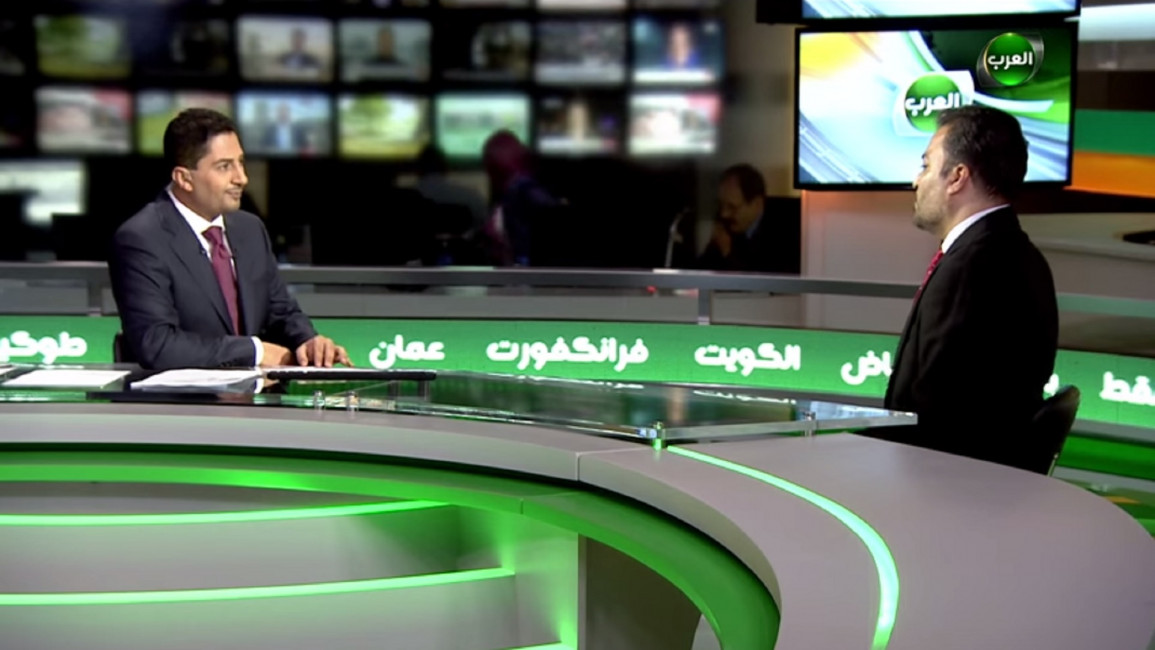Arab TV channel taken off air within 24 hours
Arab TV channel taken off air within 24 hours
The new Bahraini based Al-Arab satellite news channel has come off air within hours of launching. The suspension came on the heels of an interview with a prominent Bahraini opposition activist.
2 min read
Al Arab challenges a prominent Bahraini opposition activist hours before falling off air (AlArab/Youtube)
The Al Arab television station went live on Sunday afternoon but within hours it was off air.
The break in transmission came soon after an interview with the prominent Bahraini opposition figure Khalil al Marzooq.
During the interview al Marzooq, a senior member of the opposition Shia movement al-Wefaq, criticised the government's decision the previous day to revoke the citizenships of 72 people convicted of "terrorism" and "harming the interests of the kingdom".
The Pan Arab station posted on its official Twitter feed that output was suspended due to "technical and administrative reasons".
However, a front page story on the pro-government newspaper Akhbar al Khaleej stated that the coverage had been stopped because it did not "conform to Gulf norms".
Al Arab is headquartered in Bahrain's capital Manama and is funded by the Saudi business magnate and member of the royal family Prince al Waleed bin Talal.
Jamal Khashoggi, Al Arab's general manager told the BBC World Service's Newshour programme on Sunday - before his station fell off air - that bin Talal had promised not to intervene in the day to day running of the station.
"The other news channels have made it easier for us, they have taken sides, and we have promised not to take sides with any government, with any political party," he added.
Most of the other pan Arab stations based in the Gulf broadcast out of the United Arab Emirates and al Arab's decision to set up shop in Bahrain were seen as an endorsement of the country's prospects amidst political upheaval.
Unrest has dogged the Kingdom since large scale protests erupted in 2011. The opposition movement, primarily led by Shia groups, is demanding greater inclusion and more rights from the Sunni monarchy.
The authorities have harshly cracked down on the uprising with Saudi military and financial support.
The decision to interview Al Marzook on the first day of broadcasting was a bold move.
The Al Wefaq movement is the most powerful opposition group and its relations with the authorities have been severely strained since it boycotted the most recent elections undermining the legitimacy of the new parliament.
The Bahrain News Agency reported, Monday, that the cooperation between the authorities and the station were ongoing in order to resume broadcasts and to "complete the necessary steps in the shortest time possible".
The break in transmission came soon after an interview with the prominent Bahraini opposition figure Khalil al Marzooq.
During the interview al Marzooq, a senior member of the opposition Shia movement al-Wefaq, criticised the government's decision the previous day to revoke the citizenships of 72 people convicted of "terrorism" and "harming the interests of the kingdom".
The Pan Arab station posted on its official Twitter feed that output was suspended due to "technical and administrative reasons".
However, a front page story on the pro-government newspaper Akhbar al Khaleej stated that the coverage had been stopped because it did not "conform to Gulf norms".
Al Arab is headquartered in Bahrain's capital Manama and is funded by the Saudi business magnate and member of the royal family Prince al Waleed bin Talal.
Jamal Khashoggi, Al Arab's general manager told the BBC World Service's Newshour programme on Sunday - before his station fell off air - that bin Talal had promised not to intervene in the day to day running of the station.
"The other news channels have made it easier for us, they have taken sides, and we have promised not to take sides with any government, with any political party," he added.
Most of the other pan Arab stations based in the Gulf broadcast out of the United Arab Emirates and al Arab's decision to set up shop in Bahrain were seen as an endorsement of the country's prospects amidst political upheaval.
Unrest has dogged the Kingdom since large scale protests erupted in 2011. The opposition movement, primarily led by Shia groups, is demanding greater inclusion and more rights from the Sunni monarchy.
The authorities have harshly cracked down on the uprising with Saudi military and financial support.
The decision to interview Al Marzook on the first day of broadcasting was a bold move.
The Al Wefaq movement is the most powerful opposition group and its relations with the authorities have been severely strained since it boycotted the most recent elections undermining the legitimacy of the new parliament.
The Bahrain News Agency reported, Monday, that the cooperation between the authorities and the station were ongoing in order to resume broadcasts and to "complete the necessary steps in the shortest time possible".



